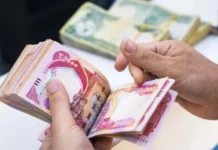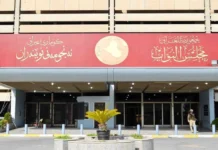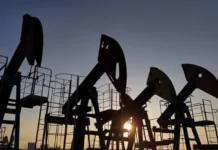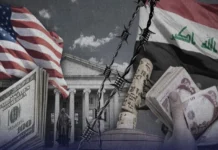Tishwash: Issuance of the first national card outside Iraq
The Ministry of Interior announced the issuance of the first national card outside Iraq.
The ministry said in a statement received by {Euphrates News} a copy of it that “in a step that is considered the first in the history of the Iraqi Ministry of Interior, the first national card was issued at the Embassy of the Republic of Iraq in the British capital, London, after a special office was opened to issue national cards there.”
He added, “It is hoped that the Ministry of Interior will open a number of national card issuance offices in a number of countries in succession to provide the best services to Iraqis residing outside the country.” link
Tishwash: Trade Bank of Iraq announces the imminent opening of a cash deposit center in Karkh
The Trade Bank of Iraq announced today, Monday, the imminent opening of the cash deposit center in the Karkh side.
The bank’s media advisor, Aqil Al-Shuwaili, said in a statement received by the Iraqi News Agency (INA): “Based on the directives of the respected Prime Minister, Mohammed Shia Al-Sudani, to provide the best services to citizens, the Trade Bank of Iraq announces the imminent opening of the (Cash Deposit Center).”
He explained that “this center receives all cash deposits only for all customers,” indicating that “this is a new service that the bank will launch with the aim of providing the best services to customers, and to contribute to reducing the pressure of cash deposits on its other branches in Baghdad link
************
Tishwash: Government advisor: Tensions and war in the region may lead to a jump in oil prices
The financial advisor to the Prime Minister, Mazhar Muhammad Salih, identified today, Monday, the indicators of the rise in oil prices in global markets, and while he attributed them to two basic variables, he indicated that if tensions and war continue in the region, a jump in prices is expected.
Saleh told the Iraqi News Agency (INA): “The oil asset cycle is subject to accelerated upward volatility across current energy market indicators and two fundamental variables that affect global oil supply and demand: the first is OPEC+’s decisions to reduce oil production on the production of OPEC countries themselves and their allies, as OPEC+ has currently implemented significant oil production cuts of 5.86 million barrels per day.”
He added, “These cuts consist of two parts: the first is a reduction of 3.66 million barrels per day extended until the end of 2025, and the other is an additional voluntary reduction of 2.2 million barrels per day that remains in effect until September 2024.”
He pointed out that “the cuts come to remove the current oil glut, which is affected by the decline in growth in the world’s most important energy-consuming economies, China,” noting that “the second variable is the geopolitical situation and the war taking place in the two energy basin regions of the world, namely the Russian-Ukrainian war and the other is the ongoing war in the Middle East, especially the Gaza and Lebanon war with the Zionist entity and its effects on the oil-producing Gulf region, which dominates more than 50% of global oil exports.”
He continued, “If military operations or geopolitical tensions continue in the two regions, oil prices are expected to jump.” link
************
Tishwash: Al-Mandlawi: Iraq is making exceptional efforts to prevent the specter of a major war from looming over the region and the world
Acting Speaker of the House of Representatives Mohsen Al Mandalawi warned the international community against the consequences of the conflict in the Middle East region turning into a comprehensive war with a greater impact on global security and peace, while stressing that Iraq is making exceptional efforts to prevent the specter of a major war from the region and the world.
In his speech delivered today, Monday, during his participation in the (149) session of the Inter-Parliamentary Union in Geneva, Al-Mandlawi called for “the formation of an international parliamentary delegation to visit Lebanon and Palestine and investigate the facts about the extent of the Zionist terrorist attacks against civilians,” describing the events taking place as a “major challenge” to the global system and a real threat to international legitimacy, indicating that “the recent attack on the UN peacekeeping forces (UNIFIL) is evidence of the extent of the arrogance of the occupation and its leaders, and has proven that this outcast entity is now outside the legal, humanitarian and international framework.”
Al-Mandlawi said, “International parliamentary bodies are facing a challenge and a test of the usefulness of their existence to express the aspirations of their peoples,” calling on them to “take a clear and rapid position to spare the region and the world the dangers of slipping into a large and destructive war,” calling on the presidency of the union and representatives of the participating parliaments to “condemn the Zionist practices and serious violations of the charters and legitimate resolutions, and take responsible action to stop the aggression against Palestine, Lebanon and the countries of the region, by demanding that the Security Council take the necessary decisions in this regard, hold the leaders of the entity accountable, prevent humanitarian disasters against civilians, provide urgent humanitarian aid and return the displaced.”
He stressed the “necessity for the Union to adopt the signing of an international agreement that criminalizes the use of artificial intelligence technology as a weapon in wars, due to its deadly impact that exceeds the impact of nuclear weapons, and to pay attention to enhancing the parliamentary performance of the legislative bodies of member states and enabling them to perform their duties, in addition to taking the initiative to organize a responsible and serious humanitarian stand to intervene by all means in order to immediately stop the wars of genocide practiced by the Zionist entity, and to save the region and the world from its danger, effects and repercussions, and to exert efforts to raise the levels of cooperation between parliaments to exchange parliamentary expertise, and to emphasize the need to respect international humanitarian law and the rights of peoples to security and stability.”
Al-Mandlawi explained that “Iraq is making exceptional parliamentary and governmental diplomatic efforts to prevent the specter of a comprehensive war from the region and the world, and that the Zionist entity is striving to ignite and expand this war by targeting diplomatic missions, leaders and symbols of countries within an aggressive methodology to control and impose wills and drag the region and the world into a comprehensive bloody war,”
Indicating that “Iraq, Yemen, Syria and Iran are at the top of the list of targeted countries, while adding that announcing the name of the highest religious authority, Sayyid Ali al-Sistani, who is a symbol of peace and moderation in the world, within the list of the entity’s targets, is nothing but evidence of its arrogance and its lack of consideration for human and heavenly values and international legitimacy.” link





